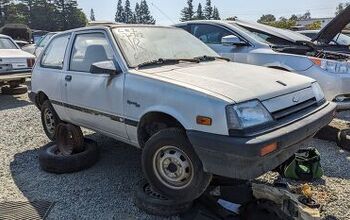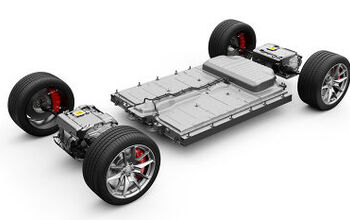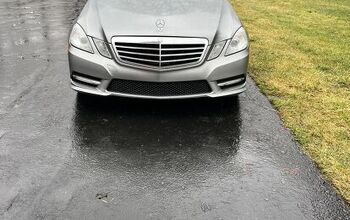Editorial: Chrysler Suicide Watch 46: Private Capital Vs. Uncle Sam
Chrysler bondholders have officially rejected the Presidential Task Force on Automobiles’ (PTFOA) “offer” to exchange 85 percent of their secured debt ($6.9B) for a stake in a reconstituted ChyrCo. The Wall Street Journal reports the bondholders’ counteroffer: the lenders would cut Chrysler’s first-lien debt by $2.4 billion, in exchange for a 40 percent equity stake and a Chrysler board seat. Oh, and they want Fiat to put up a billion dollars. Which Fiat won’t do because . . . it doesn’t have it. The bondholders’ position sounds about right. Remember: this is secured debt. If/when Chrysler is sold off in pieces, the bondholders would recoup about 65 cents on a dollar. Settling for anything less would be against their financial interest. But not their political interest. Not only has the US Treasury rejected the bondholder’s proposal, they’ve cast aspersions on the banks’ patriotism. No, really.
“It is neither in the interest of Chrysler’s senior lenders nor the country for them to advance a proposal that would yield them an unjustified return as Chrysler, its employees and other stakeholders are working tirelessly to help this company restructure,” the Treasury said in a statement.
With just eight days left before ChyrCo’s latest restructuring deadline, this one’s getting seriously ugly. We hear rumors that Chrysler CEO Bob Nardelli is going to resign this week. And there’s plenty of talk from Motown politicians pressuring Chrysler bondholders to suck it up—or face the consequences.
Late Wednesday, Michigan Gov. Jennifer Granholm blasted the banks’ counteroffer, urging them to “do the right thing.”
“They need to collapse their debt as the Obama administration has asked to ensure the viability of the company, which is critical for the families, employees, retirees, dealers, suppliers and others who rely on it,” Granhom said. “To do otherwise is not only disappointing, it is unconscionable at best.”
U.S. Rep. Gary Peters, whose district is home to Chrysler’s Auburn Hills headquarters, called the banks’ offer “an affront to taxpayers” and Chrysler employees and retirees.
“These debt holders were offered fair market value for their debt and the banks have responded by asking for a windfall,” Peters said in a statement.
Windfall? As in undeserved profits? How long before someone trots out ye olde Jewish banking conspiracy? Like I said, real ugly.
Back to the Fiat deal, upon which President Obama so publicly staked Chrysler’s future. The bondholders’ billion dollar “put up or shut up” salvo against the Italians is really just a clever way of saying no freakin’ way.
The lenders also questioned the logic of having Chrysler pair up with Fiat. The Italian company, they said, would bring “negative synergies for the first 3 years” and would enter the alliance with “limited downside for a deal of this size.” Moreover, they said it could result in a “wealth transfer from the U.S. taxpayer to a foreign company of potentially $10 billion or more.”
I spit on you spitting on me for spitting on my country. Or something like that. And wouldn’t you just know it: the PTFOA is, as predicted here, happy to walk away from the $4 billion US taxpayers have already shoveled down the ChryCo rathole. And THEN toss them EVEN MORE money.
The counteroffer also came about a week after the government presented Chrysler lenders with more than 60 pages of financial assumptions for a combined, restructured Chrysler. The government projects that Fiat-Chrysler wouldn’t be able to start making payments on its debt until 2012, said several people familiar with the report.
The government also assumes that the $4 billion it lent Chrysler largely will be wiped out, as will a combined $2 billion Chrysler owes Cerberus Capital Management LP and Daimler AG, Chrysler’s last two owners. The government would then put in an additional $6 billion to fund the operations of Fiat-Chrysler.
Not to mention the $3 billion Uncle Sam would fork over to the United Auto Workers health care fund—cause that would be churlish. More on the unions in another post. Meanwhile, the WSJ saves the story’s most fascinating aspect for the end. It seems that ChyrCo bondholders’ are at war with each other, in a David and Goliath kinda way.
In the red corner: the nestling-in-the-pocket-of-the-feds crew: J.P. Morgan, Citigroup, Goldman Sachs Group Inc. and Morgan Stanley. In the green corner: a bunch of “little guys”: Elliott Management, Stairway Capital Management, OppenheimerFunds, Perella Weinberg Partners and three dozen of so relatively small lenders. Seems . . .
Not everyone was on the same page. The big bank view was “hey guys, the offer back can’t be outrageous. This is the government,” said one of these people. “There were others, smaller lenders, who wanted to be a lot more aggressive.”
In the end, the big banks “came closer to the smaller lender view,” said another person familiar with the talks.
What was that about a nation at war with itself? Anyway, C7 or boondoggle billions. We shall see.
More by Robert Farago
Latest Car Reviews
Read moreLatest Product Reviews
Read moreRecent Comments
- Funky D The problem is not exclusively the cost of the vehicle. The problem is that there are too few use cases for BEVs that couldn't be done by a plug-in hybrid, with the latter having the ability to do long-range trips without requiring lengthy recharging and being better able to function in really cold climates.In our particular case, a plug-in hybrid would run in all electric mode for the vast majority of the miles we would drive on a regular basis. It would also charge faster and the battery replacement should be less expensive than its BEV counterpart.So the answer for me is a polite, but firm NO.
- 3SpeedAutomatic 2012 Ford Escape V6 FWD at 147k miles:Just went thru a heavy maintenance cycle: full brake job with rotors and drums, replace top & bottom radiator hoses, radiator flush, transmission flush, replace valve cover gaskets (still leaks oil, but not as bad as before), & fan belt. Also, #4 fuel injector locked up. About $4.5k spread over 19 months. Sole means of transportation, so don't mind spending the money for reliability. Was going to replace prior to the above maintenance cycle, but COVID screwed up the market ( $4k markup over sticker including $400 for nitrogen in the tires), so bit the bullet. Now serious about replacing, but waiting for used and/or new car prices to fall a bit more. Have my eye on a particular SUV. Last I checked, had a $2.5k discount with great interest rate (better than my CU) for financing. Will keep on driving Escape as long as A/C works. 🚗🚗🚗
- Rna65689660 For such a flat surface, why not get smoke tint, Rtint or Rvynil. Starts at $8. I used to use a company called Lamin-x, but I think they are gone. Has held up great.
- Cprescott A cheaper golf cart will not make me more inclined to screw up my life. I can go 500 plus miles on a tank of gas with my 2016 ICE car that is paid off. I get two weeks out of a tank that takes from start to finish less than 10 minutes to refill. At no point with golf cart technology as we know it can they match what my ICE vehicle can do. Hell no. Absolutely never.
- Cprescott People do silly things to their cars.


































Comments
Join the conversation
I have to agree with the Treasury on this. There is something deeply perverse about these banks -- which would be dead, if not for the government's TARP intervention -- suckling from the government teat on one hand, and then telling the Treasury to get stuffed on the other. I understand that companies work for the benefit of their shareholders, but the fact that the US Government saved them from ruin does, I think, imply some sort of obligation on their part to assist the government as it tries, however hopelessly, to to rescue another damaged industry. Whether the banks' intransigence is in the strategic interest of the stockholders isn't the only point here: some gratitude toward the public and the public's representatives might be appreciated. Instead, the banks take the money, run, and then spend money lobbying Congress to block a credit cardholder's "Bill of Rights" and a first-mortgage-modification addition to bankruptcy law.